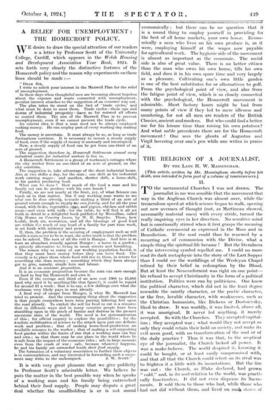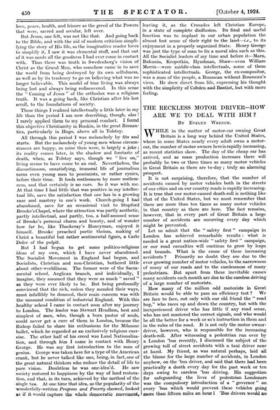THE RELIGION OF A JOURNALIST.
BY THE LATE H. W. MASSINGHAM.
[This article, written by Mr. Massingham shortly before his death, was intended to form part of a volume of reminiscences.l II.
TO the sacramental Churches I was not drawn. The journalist in me was sensible that the movement that way in the Anglican Church was almost over, while the tremendous speed at which science began to walk, opening out new avenues of thought (not, as Martineau showed, necessarily material ones) with every stride, turned the really inquiring eyes in her direction. No sensitive mind but is emotionally stirred when it first grasps the meaning of Catholic ceremonial as expressed in the Mass and in Benediction. If the soul could thus be renewed by a recurring act of communion with the Divine, what a simple thing the spiritual life became ! But the literalness of the intervening symbol repelled me. I could no more read its dark metaphysic into the story of the Last Supper than I could see the worldlings of the Wesleyan Chapel refined by their belief in redemption by the Blood. But at least the Nonconformist was right on one point— his refusal to accept Christianity in the form of a political institution. Politics were run by politicians. One knew the political character, which did not in the least degree resemble the saintly character, or the poetic character, or the free, lovable character, with weaknesses, such as the Christian humanists, like Dickens or Dostoievsky, liked to draw. It was worldly, it was limited, above all, it was unoriginal. It never led anything, it merely accepted. So with the Churches. They accepted capital- ism ; they accepted war ; what would they not accept so only they could retain their hold on society, and make its evil seem good, with no transformation of the soul or of the daily practice ? Thus it was that, to the sceptical eye of the journalist, the Church lacked all power. It was a make-believe. The world despised it, knowing it could be bought, or at least easily compromised with, and that all that the Church could retort on its rival was to frighten it a little with its incantations. . But the fire was out : the Church, as Blake declared, had grown " cold," and, in its soul-relation to the world, was practi- cally functionless. It did not even dispense its Sacra- ments. It sold them to those who had, while those who had not did without them, and lived on such stores of rove, peace, health, and leisure as the greed of the Powers that were, sacred and secular, left over.
But Jesus, one felt, was not like that. And going back to the Bible, and with the aid of modern criticism simpli- fying the story of His life, as the imaginative reader loves to simplify it, I saw it was elemental stuff, and that out of it was made all the goodness I had ever come in contact with. Thus there was truth in Swedenborg's vision of Christ as the Grand Man, who somehow came in to save the world from being destroyed by its own selfishness, as well as by its tendency to go on believing what was no longer believable. This model of true living was always being lost and always being rediscovered. In this sense the " Coming of Jesus " of the orthodox was a religious truth. It was a going back, like Christian after his lost scroll, to the foundations of society.
These things I realized intellectually a little later in my life than the period I am now describing, though, alas ! I rarely applied them to my personal conduct. I found this objective Christianity in Ruskin, in the great Roman- tics, particularly in Hugo, above all in Tolstoy.
All through this period I was melancholy by fits and starts. But the melancholy of young men whose circum- stances are happy, as mine then were, is largely a .joke ; its reality comes later, in the shadow and foretaste of death, when, as Tolstoy says, though we " live on," living seems to have come to an end. Nevertheless, the discontinuous, unsatisfying, immoral life of journalism turns even young men to pessimists, or rather cynics, before their time. It feeds restlessness by more restless- ness, and that certainly is no cure. So it was with me. At that time I had little that was positive in my intellec- tual life, save the satisfaction that one has in a growing ease and mastery in one's work. Church-going I had abandoned, save for an occasional visit to Stopford Brooke's Chapel, where the attraction was partly aesthetic, partly intellectual, and partly, too, a half-amused sense of Brooke's personal charm and beauty, and of wonder how far he, like Thackeray's Honeyman, enjoyed it himself. Brooke preached poetic theism, making of Christ a beautiful but rather sentimental figure, a Carlo Dolce of the pulpit.
But I had begun to get some politico-religious ideas of my own, which I have never abandoned. The Socialist Movement in England had begun, and Socialists, Christian and non-Christian, bothered little .about other-worldliness. The former were of the Sacra- mental school, Anglican branch, and individually, I imagine, they assumed that they were as much " saved " as they were ever likely to be. But being profoundly ,convinced that the rich, unless they mended their ways, must infallibly be damned, their main concern was with the unsound condition of industrial England. With this .healthy school I came in contact soon after my journey to London. The leader was Stewart Headlam, best and simplest of men, who, though a born pastor of souls, could never get a cure of them in London, because the Bishop failed to share his enthusiasm for the Milanese ballet, which he regarded as an exclusively religious exer- cise. The other half of his creed was Land Nationaliza- tion, and through him I came in contact with Henry George. He was my first introduction to the man of genius. George was taken here for a type of the American crank, but he never talked like one, being, in fact, one of the great natural thinkers who reduce the detail of life to pure vision. Doubtless he was one-idea'd. He saw society restored to happiness by the way of land restora- tion, and that, in its turn, achieved by the method of the -single tax. At one time that idea, as the popularity of the wonderfully-written Progress and Poverty showed, looked as if it would capture the whole democratic movement, leaving it, as the Crusades left Christian Europe, in. a state of complete disillusion. Its final and useful function was to implant in our urban population the almost lost sense of their Tight to the land—i.e., to its enjoyment in a properly organized State: Henry George was just the type of man to fix a moral idea such as this. AU the Socialist leaders of my time and before it—Marx, Bakunin, Kropotkin, Hyndman, Shaw—even William Morris—were middle-class intellectuals, some of them sophisticated intellectuals. George, the ex-compositor, was a man of the people, a Rousseau without Rousseau's vices. He drew direct from life, expressing his thought with the simplicity of Cobden and Bastiat, but with more feeling.



















































 Previous page
Previous page